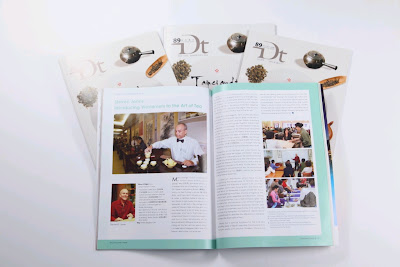dt DISCOVER TAIPEI 發現台北: Introducing Westerners to the Art of Tea
dt DISCOVER TAIPEI 發現台北2012年5.6月份
Discover Taipei Bimonthly Issue 89 May - June 2012; DTB 89; (p.44-45)
Source: Department of Information and Tourism
Steven Jones:
Introducing Westerners to the Art of Tea
Place of Origin: U.S.A.
Living in Taiwan 21 years
.Tea Master Certification (泡茶師檢定合格證書) from Lu-Yu Tea Culture Institute and Tea Ceremony Teacher Certification (茶道老師證書) from International Wu-Wo Tea Ceremony Association (中華國際無我茶會推廣協會)
.Co-author, Chinese-English Tea Studies Terminology
.Tea ceremony instructor, with lessons each Fri 19:00-21:00 at Lu-Yu Tea Culture Institute and each Tues 09:00-11:00 at Ankang Senior Center (安康安養中心) in Muzha
Blog: teaarts.blogspot.com
Many foreign visitos or residents of Taiwan enjoy drinking good gongfu tea (功夫茶), but those who have mastered the art of brewing it are rare. On Taipei's Hengyang Road (衡陽路) is the Lu-Yu Tea Culture Institute (陸羽茶藝中心), and here also is American Steven R. Jones, a certified master in the way of tea. Steven is well aware how easy it is for foreigners to get lost in the complicated world of Taiwan's teas and tea arts, and has developed a set of easy-to-grasp analogies and terms that help them understand Taiwan's many tea varieties and how to brew tea properly. He has also published a bilingual book and writes a blog on the tea arts. His goal is simple– to help fellow foreigners fall in love with Taiwan's tea culture, just as he has.
Steven was born and raised in the US. His grandmother, from England, loved a cup of English tea, and Steven grew up loving the aroma. In 1997, his sixth year in Taiwan, he sat down to his first cup of Oriental Beauty tea (東方美人). The famous honey finish delighted him, his love affair with local tea began, and he threw himself with a passion into the study of the tea arts.
Though he studied diligently, he found the specialized terminology of the tea arts hard to grasp, so he had his Taiwanese wife study first, and then explain everything to him. In this way the couple together earned their certifications as tea masters. From this experience Steven learned that translations of the terminology associated with the tea arts almost inevitably leave foreigners at a loss, and after five years of research and writing (with his wife, Chang Lishang's (張麗香) assistance); he co-published the book Chinese-English Tea Studies Terminology (中英文茶學術語) as a bridge helping foreigners to enter the rich world of Taiwan's tea culture.
"Europeans do not like their tea to be too hot,"he says,"and their hands are bigger and thicker, making it more difficult to hold small teapots."He recommends that foreigners use Oriental Beauty as their introductory leaf, because the degree of fermentation is close to that for the black teas popular in the West. For the French, who have a liking for chrysanthemum tea, he recommends chrysanthemum Pu'er tea (菊普茶), and for the Germans he recommends green tea.
In addition, Westerners often have trouble distinguishing the names used for Taiwan's teas. He recommends first learning a system with just three categories: green tea, Oolong tea, and black tea. Green tea is not fermented, is green and tender, has a light and refreshing mouthfeel, and has a fragrance with a hint of fresh grassy vegetable and dried laver. Oolong tea is half-fermented, has a taste between green tea and black tea, and possesses a hint of floral fragrance. Black tea is fully fermented, possesses warmth, and has a hint of sweetness and honey in its aroma. He also uses the metaphor of childhood, adolescence, and adulthood to describe the difference in character between the three types of tea.
Steven has a special fondness for the brisk and refreshing taste of Taipei's Wenshan Pouchong and for the nutty aroma of Muzha Iron Goddess. "Drinking tea leaves me feeling calm and refreshed," he says. He recommends that travelers to Taiwan go home with plenty of quality local tea, because Taiwan's prices are so reasonable. Owners of local tea shops are usually happy to treat customers to a cup of fine brew, and this friendly, intimate introduction to the fine art of tea culture is something that many foreign travelers remember with affection long after returning home.
Photos:
1. Steven R. Jones, holder of formal Tea Master Certification, is expert at the art of brewing.
2. At every Taipei tea shop, tea is formally presented to customers.
3. Steven uses a teaching approach that allows foreigners relaxed exploration of Taiwan's teas.
4. Every two years the Lu-Yu Tea Culture Institute stages the International Wu-Wo Tea Ceremony and Tea Culture Festival at locations around the world.
dt DISCOVER TAIPEI 發現台北2012年5.6月份
Discover Taipei Bimonthly Issue 89 May - June 2012; DTB 89; (p.44-45)
Source: Department of Information and Tourism
http://teaarts.blogspot.com/2012/05/dt-discover-taipei-introducing.html
http://teaarts.blogspot.com/2012/05/dt-discover-taipei-introducing.html
Taipei Folk, In Their Own Words


